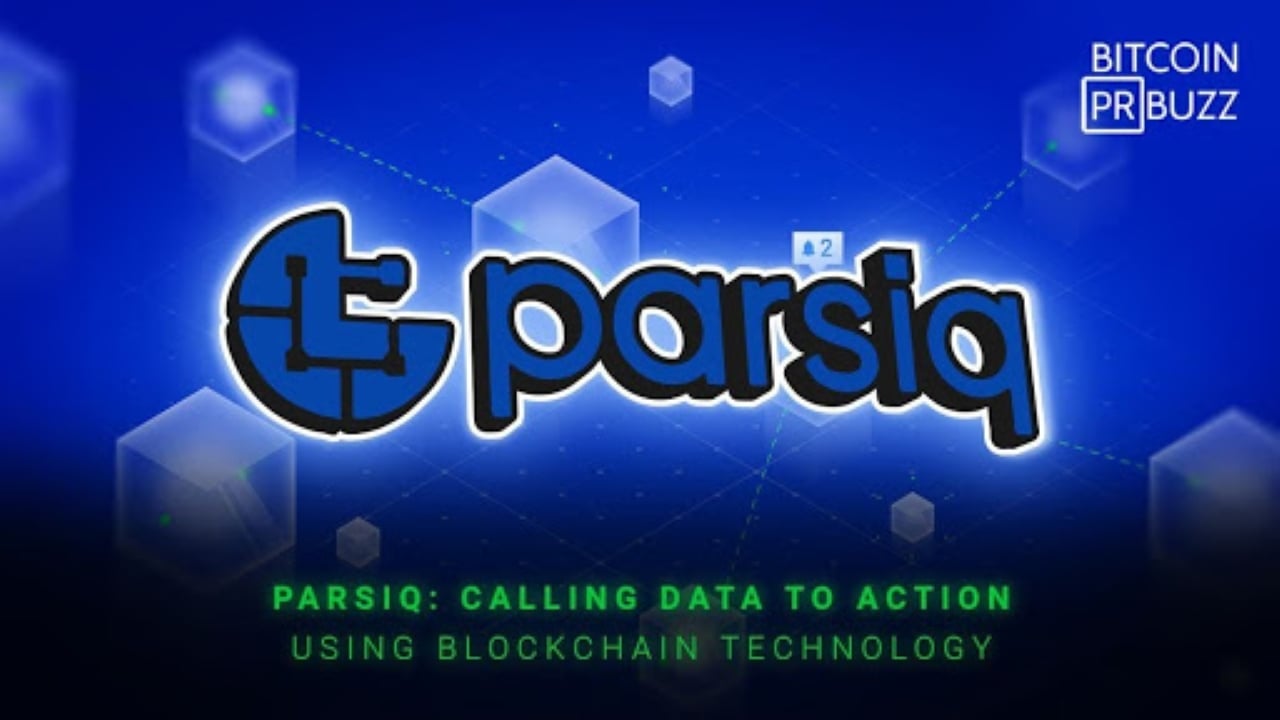PARSIQ: Calling Data to Action Using Blockchain Technology


sponsored
Over the past 13 years, the world has seen innovation at its finest. The creation of Bitcoin, the development of cryptocurrencies, the launch of blockchain projects, Decentralized Applications (Dapps), and far more. To gauge the financial evolution of blockchain one need only consider the price of Bitcoin in 2013 and compare it to today. In 2013, a single Bitcoin was worth $22. Today, Bitcoin is comfortably over $60,000, with analysts suggesting $100,000 is in sight. With the steady expansion of blockchain technology, the Blockchain as a Service (BaaS) revolution has begun. PARSIQ strives to pioneer the use cases of this BaaS revolution.
PARSIQ: An Overview
PARSIQ promotes BaaS through its next-gen monitoring and intelligence platform. Users can observe and utilize blockchain data for a number of use cases. These include:
- Tracking digital assets in real-time
- Notifications of Blockchain network activity
- Gathering and processing on-chain data
- Combining on-chain with off-chain data such as Risk Data/Market Data etc.
PARSIQ also enables multi-blockchain interoperability and the ability to create complex workflows between them. Easy-to-use, flexible, and scalable; PARSIQ removes the complexity from blockchain-specific workflows so that users can efficiently and comfortably transform blockchain data.
Moreover, PARSIQ provides integration with many high-profile blockchains such as Ethereum, Binance Smart Chain, and Solana. With this wide range of blockchain platforms steadily increasing, the potential use cases for users only continues to increase.
The main business objective and vision of PARSIQ is to monitor and protect blockchain data. PARSIQ enables the creation of fully customizable complex monitoring solutions with the ability to integrate on-chain data with notification systems, effectively creating alerts for blockchain-based data events.
At the core of PARSIQ’s first day of formation, these two groupings pioneer the PARSIQ platform’s vision. These encompass the utilization of on-chain/off-chain data and workflow optimization as we will explore further below.
Keeping Up-to-Date Block by Block
One of the main use cases of PARSIQ is its ability to facilitate flexible and easy-to-use on-chain analysis. On-chain analysis provides a fundamental approach as opposed to a sentimental approach and can be used to identify historical trends. PARSIQ enables effective on-chain analysis via the use of its platform and many analysis tools.
Both small businesses and large enterprises can implement on-chain analysis using PARSIQ’s blockchain connection automation, fully customizable workflows, and versatile integration selection. Spanning on-chain data and off-chain apps, workflows can be augmented with conditional logic, aggregate, formatting of data, and far more to effectuate all analysis targets.
Taking PARSIQ’s Smart-Trigger automation into consideration, this process further develops next-gen on-chain analysis. Smart-Trigger receiving input events, processes each according to the user-specified logic, and produces intermediate/output events in correlation with User Data specifications.
When a user defines their monitoring targets in User Data, the Smart-Trigger can be programmed using ParsiQL language to process and consider all monitored information. In layman’s terms, using the Smart-Trigger process, users are able to amalgamate mass information quickly and effectively to conclude their on-chain analysis.
Smart-Trigger: Developing Upon Blockchain Oracle Interoperability
Blockchain oracles enable blockchain or smart contracts to interact with external data. This facilitates the on and off-chain pathway and lays the foundation for interoperability between blockchains.
Smart-Trigger contributes to the Blockchain technology space by directly improving upon this interoperability via its monitoring and data-gathering utilities. As with any smart contract or blockchain, an oracle is required to facilitate the transferral of information between it and the real world. How Smart-Trigger builds upon this process is by automating the movement of data across multiple blockchain integrations, all based upon user-specified requirements.
Unlike oracles, Smart-Triggers are flexible, easy-to-use, fully customizable, and can be tailored for any user’s needs. Using the logic chosen, the mass information gathered can be filtered, aggregated, and specified down to the minutest criteria. This process cuts time requirements, eliminates unnecessary information transferral, and develops upon the core of oracle interoperability.
An on-chain analysis tool of this caliber fits comfortably into the same league of analysis tools employed by businesses such as Chainalysis. Similarly, PARSIQ’s Smart-Trigger enables the same efficiency of risk management, blockchain data monitoring, and data-gathering.
Indeed, PARSIQ Smart-Triggers have the potential to bridge the gap between consumer apps and on/off-chain analysis using an approach that has never been trialed before.
Optimizing the Workspace Using PARSIQ
Another strong use case of PARSIQ is the efficient optimization of workflow applications. Used in conjunction with Smart Triggers, PARSIQ workflows can be fully customized, organized, and utilized to establish a solution that grows with the user.
A workflow facilitates a multi-action data transaction and automates responses to specified events using Smart-Triggers. An example could be as follows:
- Smart-Trigger: A Bitcoin transaction – an address has received a new transaction.
- Telegram Bot: user alerted via Telegram integration about the new transaction.
- Data Risk Score: adds a risk score utilizing off-chain data.
- Slack Alert: notification of the risk score is provided to the user compliance team on Slack.
This multi-step process of action and response is referred to as a workflow and can be completely customized to automate a chain of reactions based upon a Smart-Trigger event. Using the array of tools provided, users can customize their workflow to develop real value for their business.
With an easy drag & drop visual editor, The PARSIQ platform will allow users to easily structure their own business logic and input conditions with an easy-to-use user interface currently under construction. Deploying Smart-Triggers to achieve automation goals, users can specialize workflows tailored to their own business. This cuts time requirements, response times and allows more time for the development of more important business aspects.
When PARSIQ secures integration with Slack and Trello, both communication and task management could then be managed simultaneously via PARSIQ workflow optimization. This potential process would begin with a Smart-Trigger, which then automates the communication responses. Following this theoretical chain of automation, the automated Slack response to the Smart-Trigger would instigate a Trello response which would organize and update task management layouts.
The Subscription Model Re-evaluated
The PARSIQ subscription model, IQ Protocol, aims to provide a cheap and flexible method for on-chain subscription implementation – without sacrificing workflow quality/utility. Rather than staking to access PARSIQ’s IQ services, this new Decentralized Finance (DeFi) framework enables businesses to subscribe. This framework works to avoid token issuance pitfalls often encountered by other BaaS’s. To deliver this subscription model service, PARSIQ has introduced the notion of ‘Power Tokens’.
Power Tokens are not considered a form of payment, but instead, a measure of energy generation. The energy accumulated takes the role of being an accountable unit spent for service consumption (much like gas fees for Ethereum transactions). This token model proposed by PARSIQ sets the stage for collateral-less borrowing of Power Tokens which in turn ensures the loan side of the IQ Protocol is risk-free. PARSIQ’s innovation via the IQ Protocol opens up mainstream adoption of DeFi participation while nullifying the associated risks. Establishing tokenomics that are both sustainable and measurable over time, the IQ Protocol aims to utilize Power Tokens to revolutionize the future of BaaS.
PARSIQ Is the Future
Indeed, PARSIQ’s IQ Protocol is a determined attempt to bridge the worlds of DeFi and mainstream, one of the first such attempts seen in the space since its rise to popularity last summer. The proposition of an entirely new approach to obtaining utility from DeFi platforms in a subscription-like manner puts IQ in step with the traditional subscription model used in mainstream application development.
This results in a shallower learning curve for mainstream organizations looking to develop in the DeFi space, whilst also alleviating some of the concerns associated with holding often volatile tokens to gain access to DeFi platforms. In addition, PARSIQ’s integrations are a clear effort to lower the cost of development, as well as encourage an open and multi-platform approach to development. This gives potential developers more flexibility when it comes to choosing where to base in the DeFi space, as well as opening up the mainstream world to several DeFi-focussed platforms at the same time.
The future of DeFi depends on its integration with the mainstream world. PARSIQ embodies the move in that direction, with IQ being its defining step.
To learn more about PARSIQ and its vision for the future of DeFi today, visit their main page here. To learn more about IQ Protocol and how PARSIQ uses it to re-imagine DeFi, read the IQ blog post here.
This is a sponsored post. Learn how to reach our audience here. Read disclaimer below.
Image Credits: Shutterstock, Pixabay, Wiki Commons
Disclaimer: This article is for informational purposes only. It is not a direct offer or solicitation of an offer to buy or sell, or a recommendation or endorsement of any products, services, or companies. Bitcoin.com does not provide investment, tax, legal, or accounting advice. Neither the company nor the author is responsible, directly or indirectly, for any damage or loss caused or alleged to be caused by or in connection with the use of or reliance on any content, goods or services mentioned in this article.
Read disclaimer

